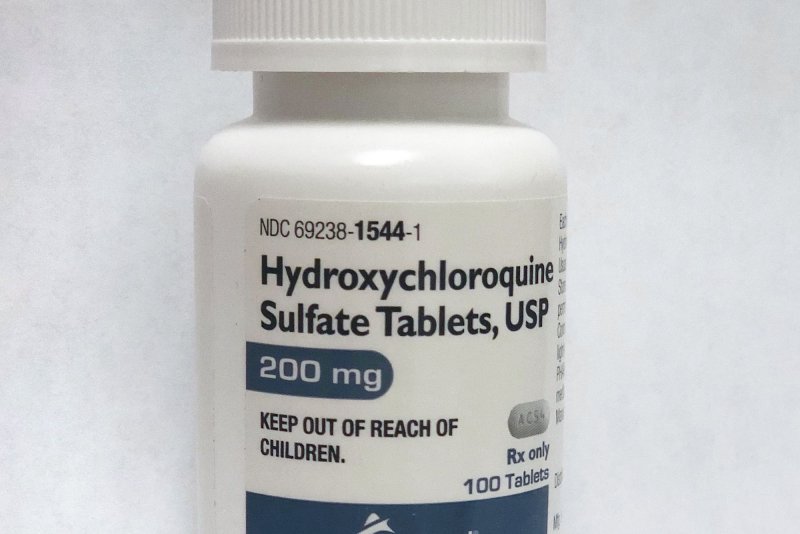A bottle of hydroxychloroquine 200 mg tablets sits on a pharmacy store shelf in Salem, New York on March 23. Photo by UPI |
License Photo
April 24 (UPI) -- The U.S. Food and Drug Administration on Friday issued a warning about serious and potentially life-threatening side effects of chloroquine and its sister drug, hydroxychloroquine, including heart rhythm problems that have been seen in clinical trials.
The drugs, which were granted an emergency use authorization by the FDA on March 28, have been shown to cause serious heart problems in patients with severe COVID-19, as evidenced by a new analysis published Friday in the journal JAMA Network Open.
The antimalarial medications have yet to receive agency approval for use in patients with the new coronavirus, except in clinical trials and under hospital supervision.
"While clinical trials are ongoing to determine the safety and effectiveness of these drugs for COVID-19, there are known side effects of these medications that should be considered," FDA Commissioner Stephen Hahn said in a press release.
Researchers in Italy report in the new analysis that up to 40 percent of patients who received 600 milligrams of chloroquine twice daily died -- due at least in part to heart-related side effects associated with the drug used to treat malaria. In comparison, 15 percent of those who received low-dose treatment with the drug -- at 450 milligrams twice daily -- died, either from the disease caused by the new coronavirus or heart-related side effects from the medication.
In addition, only 22 percent of the patients evaluated in the study were found to be negative for the virus after four days of treatment with the drug. The researchers had planned to enroll 440 study participants, but the safety monitoring board overseeing the trial terminated it after only 81 individuals had been enrolled because of the occurrence of severe side effects.
Although the results of the JAMA Network Open study are preliminary, and based on observations from only 81 patients, they amount to the latest setback in ongoing efforts to find treatments or a cure for COVID-19. The illness, caused by the new coronavirus SARS-CoV-2, has sickened more than 2.7 million people globally, and caused death in nearly 200,000, according to the latest estimates from Johns Hopkins University.
On Thursday, data released in error suggested that the antiviral remdesivir offered limited benefit, while results from a U.S. Veterans' Administration study that came to light earlier this week found patients treated with hydroxychloroquine experienced little if any improvement in respiratory symptoms associated with the virus. It should be noted, however, that neither of these studies has been peer-reviewed.
"The information (in the V.A. study) is anecdotal," Dr. Anthony Fauci, director of the National Institute of Allergy and Infectious Diseases, told reporters earlier this week. "It was not done in a controlled clinical trial. So you really can't make any definitive statement about it."
Both hydroxychloroquine and chloroquine have been around for a number of years, and have been used to treat malaria, a mosquito-borne disease that infects more than 200 million people worldwide each year, and kills more than 400,000. The drugs, given alone or in combination with azithromycin or oseltamivir, have been touted as a potential treatment for COVID-19, in spite of a lack of any scientific evidence showing any benefit.
Azithromycin and oseltamivir have long been used to treat respiratory infections, with the latter often given to people with certain types of the flu. The findings of the Italian study published in JAMA Network Open, however, suggest that a high percentage of patients with severe COVID-19 who receive chloroquine with either of these two drugs may experience disruptions in their heartbeat as measured by electrocardiogram.
The disruptions could be a precursor for arrhythmia, or irregular heartbeat, which can be a sign of more serious heart disease. COVID-19 itself has already been linked with serious heart complications.
The FDA cautioned that while it has approved the malaria drugs for use in COVID-19 patients, extra attention must be paid to patients because of the early reports of side effects and complications.
"We understand that health care professionals are looking for every possible treatment option for their patients and we want to ensure we're providing them with the appropriate information needed for them to make the best medical decisions," Hahn said.















